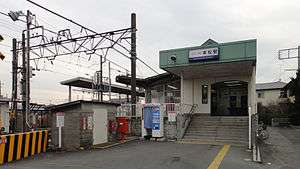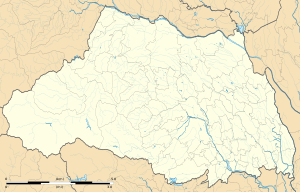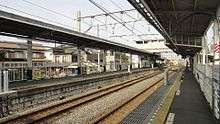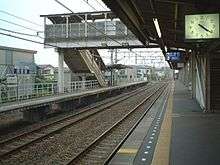Ippommatsu Station (Saitama)
Ippommatsu Station (一本松駅, Ipponmatsu-eki) is a railway station on the Tobu Ogose Line in Tsurugashima, Saitama, Japan, operated by the private railway operator Tobu Railway.[1]
TJ41 Ippommatsu Station 一本松駅 | |
|---|---|
 Ippommatsu Station entrance in January 2014 | |
| Location | 80-3 Nakashinden, Tsurugashima-shi, Saitama-ken 350-2226 Japan |
| Coordinates | 35°56′25″N 139°22′13″E |
| Operated by | |
| Line(s) | TJ Tobu Ogose Line |
| Distance | 2.8 km from Sakado |
| Platforms | 2 side platforms |
| Tracks | 2 |
| Other information | |
| Station code | TJ-41 |
| Website | Official website |
| History | |
| Opened | 16 December 1934 |
| Traffic | |
| Passengers (FY2014) | 4,041 daily |
| Location | |
 Ippommatsu Station Location within Saitama Prefecture  Ippommatsu Station Ippommatsu Station (Japan) | |
Lines
Ippommatsu Station is served by the Tobu Ogose Line, a 10.9 km single-track branchline running from Sakado to Ogose, and is located 2.8 km from the terminus at Sakado.[2] During the daytime, the station is served by four trains per hour in each direction.[3]
Station layout


The station consists of two side platforms serving two tracks forming a passing loop on the single-track Ogose Line. The platforms are long enough for four-car trains. The single exit and station office is located at the Sakado end of the up (Sakado-bound) platform.[4]
History
The station opened on 16 December 1934,[2] initially with a single platform on the single-track line.[4] Ippommatsu Station takes its name from an intersection of roads about 150 metres to the northwest called "Ippommatsu Crossing". This intersection was named during the Edo Period for a single (ippon) pine tree (matsu) which stood nearby.[4] Today, the crossing is a busy 5-way traffic intersection.
Ippommatsu became a staffed station from 17 May 1965.[2]
Platform edge sensors and TV monitors were installed in 2008 ahead of the start of driver-only operation on the Ogose Line from June 2008. A roof was also added to the previously uncovered down (Ogose-bound) platform in 2008.
From 17 March 2012, station numbering was introduced on the Tobu Ogose Line, with Ippommatsu Station becoming "TJ-41".[6]
Passenger statistics
In fiscal 2014, the station was used by an average of 4,041 passengers daily.[7] The daily passenger figures for previous years are as shown below.
| Fiscal year | Daily average |
|---|---|
| 2010 | 4,176[8] |
| 2011 | 4,027[9] |
| 2012 | 4,062[10] |
| 2013 | 4,092[11] |
| 2014 | 4,041[7] |
Surrounding area
Lying close to the boundary between Sakado and Tsurugashima cities, Ippommatsu Station's only exit opens onto a busy road which crosses the Ogose Line. A current problem is the narrowness of the road and the level crossing across the line. In the morning and at evening, pedestrian and vehicular traffic often become congested with commuters and students from nearby schools.
Other buildings in the area include:
- Sakado City Ōya Community Center
- Sakado Municipal Elementary School
- Tsurugashima City West Community Center
- Tsurugashima Seifū Senior High School
- Tsurugashima West Junior High School
- Shinchō Elementary School
- Tsurugashima Shimoshinden Post Office
- Sakado Morito Post Office
Future developments
The city of Tsurugashima is supporting future redevelopment of the station area, with plans to build a new overhead station structure and a station forecourt on the south side providing better vehicular access.[12]
See also
- List of railway stations in Japan
- Ippommatsu Station (Fukuoka), in Fukuoka Prefecture
References
- "Ippommatsu Station information" (in Japanese). Japan: Tobu Railway. Retrieved 31 January 2011.
- Terada, Hirokazu (July 2002). データブック日本の私鉄 [Databook: Japan's Private Railways]. Japan: Neko Publishing. p. 200. ISBN 4-87366-874-3.
- Tobu Tojo Line Timetable, published March 2013
- Yajima, Shuichi (1 July 2013). 東武東上線 街と駅の1世紀 [Tobu Tojo Line - A Century of Towns and Stations]. Tokyo, Japan: Sairyusha. p. 74. ISBN 978-4-7791-1722-0.
- 構内マップ [Ippommatsu Station map] (in Japanese). Japan: Tobu Railway. Retrieved 4 December 2012.
- 「東武スカイツリーライン」誕生! あわせて駅ナンバリングを導入し、よりわかりやすくご案内します [Tobu Sky Tree Line created! Station numbering to be introduced at same time] (PDF). Tobu News (in Japanese). Tobu Railway. 9 February 2012. Archived from the original (pdf) on 8 August 2012. Retrieved 22 March 2012.
- 駅情報(乗降人員) [Station information (Passenger statistics)] (in Japanese). Japan: Tobu Railway. 2015. Archived from the original on 6 August 2016. Retrieved 13 June 2015.
- 駅情報(乗降人員) [Station information: Passenger figures] (in Japanese). Japan: Tobu Railway. 2011. Archived from the original on 5 April 2012. Retrieved 13 June 2015.
- 駅情報(乗降人員) [Station information: Passenger figures] (in Japanese). Japan: Tobu Railway. 2012. Archived from the original on 23 August 2013. Retrieved 13 June 2015.
- 駅情報(乗降人員) [Station information: Passenger figures] (in Japanese). Japan: Tobu Railway. 2013. Archived from the original on 25 April 2014. Retrieved 13 June 2015.
- 駅情報(乗降人員) [Station information: Passenger figures] (in Japanese). Japan: Tobu Railway. 2014. Archived from the original on 30 October 2014. Retrieved 13 June 2015.
- 地区別構想 [Concepts by district] (PDF) (in Japanese). Japan: City of Tsurugashima. 2012. p. 102. Archived from the original (PDF) on 28 April 2014. Retrieved 10 September 2016.
External links
| Wikimedia Commons has media related to Ippommatsu Station. |
- Official website (in Japanese)